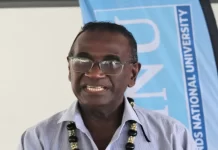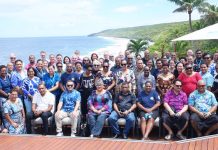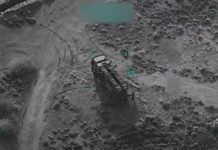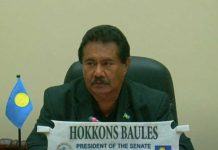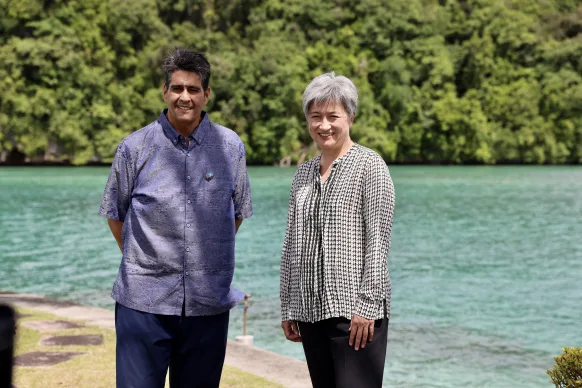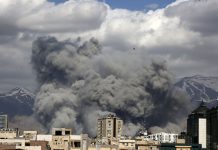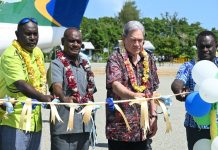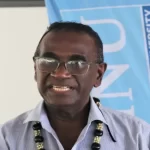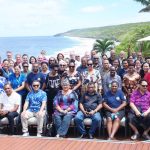The president of Palau has called on Australia to intervene in negotiations with Washington over funding for the Pacific as he warns that Beijing is aggressively pursuing its interests across the region with the goal of forcing the islands to “sacrifice” Taiwan.
Surangel Whipps jnr, who has led the strategically important island nation that divides Hawaii from Asia for the past four years, said the Chinese government was targeting officials across the Pacific at the same time as the U.S Congress delays billions of dollars in funding it promised regional leaders would be ready by October.
Whipps told this masthead that his country was now facing a “fiscal cliff”.
Months of delays by the U.S have created a US$50 million shortfall in the country’s annual budget, leaving it vulnerable to a lobbying blitz from Beijing.
“I don’t want to go get a bridge loan from China. But maybe if things can’t happen in Washington fast enough, this is a time for our allies to get together and say, ‘Well, we’re here,’” he said in an interview.
“[The Pacific] is taken for granted. Now more than ever is a time when Washington needs to understand the strength of the partnership.”
Describing China’s overtures as intense, Whipps said his government had been approached repeatedly by Chinese business executives and officials over the past year.
“They are offering everything from fishing ports, fuel storage facilities, expanding the runway, building resorts and hotels,” he said. “There are real needs that have not been realised, and I think because of that, China is filling a void.”
But the country has also been burnt by its experience in 2016 when tens of thousands of Chinese tourists were encouraged to visit it by Beijing, only for the tap to be turned off suddenly when Palau would not switch its diplomatic allegiance from Taiwan.
“People have tasted it. They know that there’s economic opportunity out there with China,” he said. “But it’s economic coercion. That’s a way of beating up Palau. They hope that they will beat us into submission, and then we will change our stance.”
The warning follows Nauru’s switch from Taiwan to China and Papua New Guinea’s interest in a security deal with Beijing in January. The developments have heightened Australian officials’ concerns about the Chinese government’s intentions in some of its closest neighbours.
Solomon Islands Prime Minister Manasseh Sogavare, who switched Honiara’s allegiance from Taipei to Beijing in 2019, said the region was in the midst of a geopolitical war between China and the West. On Wednesday, he vowed to adopt a “look north foreign policy” that will strengthen the country’s relations with China while nurturing ties with other traditional partners such as Australia.
The switch has seen Beijing pour hundreds of millions of dollars into Solomon Islands and put Australia and the U.S on notice as other Pacific nations including Fiji weigh up the benefits of greater economic investment by China against the security implications for the region.
In a letter to an unnamed U.S senator on 09 February, Whipps warned that Congress’ failure to pass US$2.3 billion in assistance under the Compacts of Free Association Act was pushing the Pacific further towards China. The legislation has languished in Congress since October along with bills for funding support for Ukraine. The COFA Act was designed to provide economic support for the Pacific in exchange for ongoing American military influence over an area larger than the U.S.
“Every day it is not approved plays into the hands of the Chinese Communist Party and the leaders here (some of whom have done ‘business’ with the PRC) who want to accept its seemingly attractive economic offers – at the cost of shifting alliances, beginning with sacrificing Taiwan,” he wrote.
The letter was first published by Cleo Paskal at the Foundation for Defence of Democracies.
“The PRC [People’s Republic of China] has already offered to ‘fill every hotel room’ in our tourism-based private sector – and ‘more if more are built’. The legislation is critical for both of our democracies and a free and open Indo-Pacific.”
Palau is one of Taiwan’s last dozen remaining diplomatic allies as Beijing intensifies its pursuit of its diplomatic partners by offering millions of dollars in economic investment. Hilda Heine, the President of the Marshall Islands, which also recognises Taiwan, said there had been “carrot and stick” efforts from China to shift its alliances, including discontinuing support of Taiwan.
The Chinese Communist Party has never ruled Taiwan but claims its democratic neighbour as its own and has been on a decades-long campaign to eliminate its diplomatic allies.
In November, China’s special envoy for the Pacific islands Qian Bo told Pacific leaders that co-operation with China would bring major economic opportunities for the region.
“China stands ready to promote the synergy of development strategies with Pacific Island countries and accelerate the building of an even closer community with a shared future between the two sides,” he said.
Heine said her rejection of a Chinese government proposal to develop an atoll created a domestic push to topple her government. “Later, people from the PRC were convicted by a US court of bribing proposal supporters in our parliament who voted against me,” she said.
In December, this masthead and 60 Minutes revealed that Chinese officials followed, bribed and wrote entire statements on behalf of foreign-elected leaders in another Pacific country, the Federated States of Micronesia.
In one email, the foreign secretary was urged by China’s ambassador to Micronesia to sign documents committing the country to a new development deal with Beijing without the president’s knowledge.
Former Micronesian president David Panuelo said Pacific leaders had to be aware of the “fine line in what they are trying to get and do” or “it can trap your nation in ways that you would not know about.
SOURCE: SMH/PACNEWS


